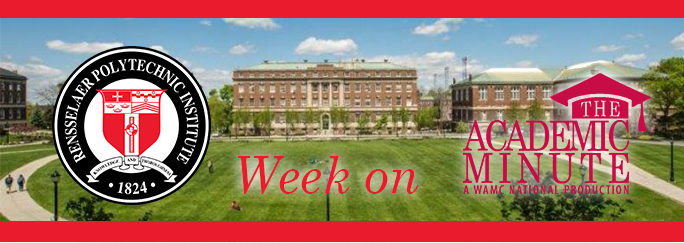
Academic Minute from 1.15 – 1.19
Monday, January 15th
Jennifer Hurley – Rensselaer Polytechnic Institute
Circadian Clock Disruption
Dr. Jennifer Hurley received her B.S. from Juniata College in 2004 in Molecular Biology and her Ph.D. at Rutgers/UMDNJ for studying the function of Toxin-Antitoxin modules. She completed her Postdoctoral fellowship at the Geisel School of Medicine at Dartmouth investigating the circadian clock. Dr. Hurley joined the Department of Biological Sciences at Rensselaer Polytechnic Institute in 2015 as an Assistant Professor. Dr. Hurley’s research focus is on the fundamental mechanisms underlying circadian rhythms. Circadian rhythms are an important component in understanding how organisms function within the photoperiodic world that we live in; defects in the circadian clock or disruptions in circadian rhythms are linked to a wide range of sleep, metabolic and psychological disorders in humans. Her lab investigates the relationship between the core clock mechanism and the output that the clock controls using a combination of molecular genetics and biochemical techniques as well as a biostatistical/computational approach using “omic” scale data. Dr. Hurley’s work has been recognized by the Genetics Society of America, the American Society for Biochemistry and Molecular Biology, and the Ruth Kirschstein National Research Service Award.
Tuesday, January 16th
Kevin Rose – Rensselaer Polytechnic Institute
What We Don’t Know About Climate Change
Dr. Kevin Rose received his Ph.D. in Ecology, Evolution, and Environmental Biology from Miami University studying the causes and consequences of variation in ultraviolet radiation in aquatic ecosystems. Following his Ph.D., Dr. Rose went on to a postdoctoral fellowship at the Smithsonian Environmental Research Center, an AAAS Science and Technology Policy Fellowship at the U.S. National Science Foundation, and a postdoctoral appointment at the University of Wisconsin-Madison. Dr. Rose joined at the Department of Biological Sciences at Rensselaer Polytechnic Institute in 2015 as the Frederic R. Kolleck ’52 Career Development Chair in Freshwater Ecology. Dr. Rose’s research spans aquatic ecology and biogeochemistry to understand how natural and anthropogenic processes affect the structure and function of freshwater ecosystems. A goal of his lab group is to forecast the future state of lake ecosystems in a regional to global context, with an emphasis on understanding how freshwater ecosystems are changing in response to local to global changes in land use and climate. This interdisciplinary research draws on skills in biology, ecology, biogeochemistry, advanced environmental sensors, and computational modeling.
Wednesday, January 17th
Pankaj Karande – Rensselaer Polytechnic Institute
Engineering Living Tissue for Transplantation
Prof. Karande joined the Chemical and Biological Engineering Department at Rensselaer in 2008. Before joining Rensselaer, Prof. Karande was a postdoctoral scholar in the Chemical Engineering Department and Center for Cancer Research at Massachusetts Institute of Technology. He obtained his Ph.D. from UC Santa Barbara in 2006 where his thesis work focused on the use of chemical enhancers for transdermal drug delivery. Prof. Karande has received numerous awards for his work including The Edison Award for best Product in Science and Medicine (2009), The Anna Fuller Fellowship in Molecular Oncology (2006-2007), Outstanding Pharmaceutical Paper by the Controlled Release Society (2005) and the Fionna Goodchild Award for Excellence in Undergraduate Mentoring (2004). Prof. Karande is an inventor on several patents in the area of Transdermal Formulation Discovery and Novel High Throughput Screening Platforms. He has served as scientific advisor to fqubed Inc., a soft materials innovation company (now part of Nuvo research).
Thursday, January 18th
Robert Linhardt – Rensselaer Polytechnic Institute
Kicking Lyme Disease Without Antibiotics or Vaccines
After 21 years on the faculty of the University of Iowa, Linhardt joined Rensselaer in 2003 as a senior constellation professor. Since 2008 Dr. Linhardt’s group has been working on a collaboration to bioengineer Heparin from E. coli. During his career in Iowa, he spent eight years as the university’s F. Wendell Miller Distinguished Professor of Chemistry and ten years as a member of the Executive Committee of the Center for Biocatalysis and Bioprocessing. Linhardt began his professional career with a three-year postdoctorate in chemical engineering at Massachusetts Institute of Technology.
Friday, January 19th
Qiang Wu – Rensselaer Polytechnic Institute
Effects of CFO Gender on Financial Reporting Decision Making
Qiang Wu’s current research interests include tax avoidance, accounting conservatism, debt contracting, earnings quality, auditing quality, corporate governance, financial analysts, and corporate social responsibility. His research works have appeared in premier journals including Journal of Accounting Research, The Accounting Review, Journal of Financial Economics, Contemporary Accounting Research, and Journal of Financial and Quantitative Analysis. His works have also been cited by business media including Bloomberg, CNBC, Reuters, Dow Jones Newswires, AICPA, Accounting Today, AAA, CFO Magazine, Catalyst, Bankrate.
